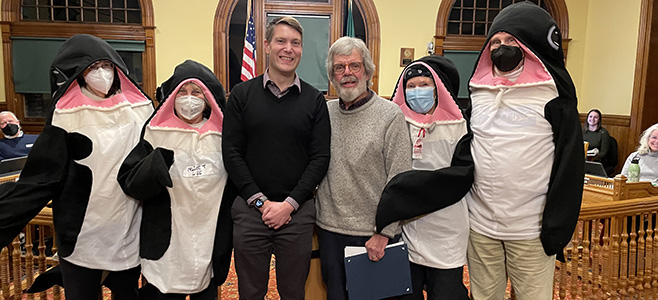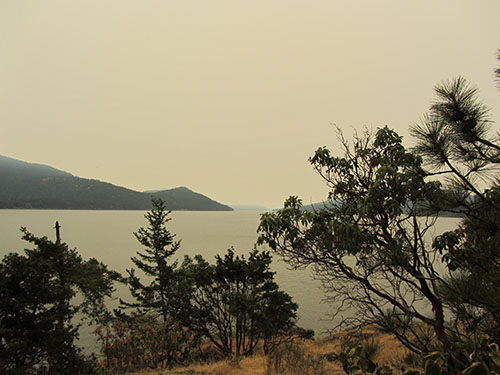||| FROM KRISS KEVORKIAN for LEGAL RIGHTS FOR THE SALISH SEA |||
Port Townsend, WA —Yesterday evening, Port Townsend’s Mayor David J. Faber signed a Proclamation describing the City of Port Townsend’s support for action by local, state, federal and tribal governments that secure and effectuate the rights of the Southern Resident Orcas.
The Southern Resident Orcas (“the Orcas”) are culturally, spiritually, and economically important to the people of Washington State and the world. However, despite federal legal protections for nearly two decades, the population continues to decline and is critically endangered, with only 73 individuals left in the wild.
The Proclamation states that the Southern Resident Orcas possess the inherent rights to: “life, autonomy, culture, free and safe passage, adequate food supply from naturally occurring sources, and freedom from conditions causing physical, emotional, or mental harm, including a habitat degraded by noise, pollution and contamination.”
Kriss Kevorkian of Legal Rights for the Salish Sea (LRSS), with the help of Patrick Johnson, of the Green Sanctuary Environmental Action Team from Quimper Unitarian Universalist Fellowship, introduced the idea of the Proclamation. “We are so grateful to the Mayor and City Council of Port Townsend for taking bold action to save these unique and critically endangered Orcas.” says Kriss Kevorkian, founder of LRSS.
Legal Rights for the Salish Sea partnered with Earth Law Center (ELC) in 2018, and are working to educate local communities on a new legal tool to protect Nature and communities – Rights of Nature. Together, they are leading a
campaign to gain support for recognizing the rights of the Orcas at the local and Washington State level, and to take immediate actions to protect and restore the Orcas’ rights by addressing their main threats to survival.
“Recognizing the Southern Residents’ legal rights means that we must consider their wellbeing and needs in addition to human interests in decision making, and that they will have a voice in a variety of forums, including courts. Through their human guardians acting on their behalf and in their best interests, the Orcas will be able to express what they need to exist, thrive, and evolve,” explained Elizabeth Dunne, ELC’s Director of Legal Advocacy.
“When structures such as the lower Snake River dams interfere with the Southern Residents’ ability to obtain prey (salmon) crucial for their survival, then to realize their rights we must find solutions to remedy the problem,”
said Dunne.
Legal rights for species and their habitats is not new. Hundreds of Rights of Nature laws exist in approximately 30 countries. Both San Francisco and Malibu passed resolutions protecting the rights of whales and dolphins in their coastal waters in 2014; New Zealand’s Government legally recognizes animals as sentient beings; the Uttarakhand High Court of India ruled that the entire animal kingdom are legal entities with rights; and the United Kingdom now recognizes lobsters, crabs, and octopus as sentient beings.
Howard Garrett, co-founder of the Orca Network, supports this effort because he sees recognizing the Southern Residents’ inherent rights as “essential to the orcas’ survival and well-being. Without this recognition, people will
continue to put economic and self-interest above the Southern Residents’ very survival.”
“Over the past few years, we have continued to see the population decline, and actions to recover the population have been slow and piecemeal. Business as usual is not working” says Michelle Bender. “We thank the leadership of Port Townsend and hope more local communities support a call for policies that give the Orcas, and all Nature, a voice in decision making and a seat at the table.”
This effort is also supported by an online change.org petition and declaration of understanding, of which over 10 organizations have signed onto. Earth Law Center created a toolkit to help advocates introduce a resolution to their local communities, share the campaign on social media and other helpful talking points. You can take action and view the toolkit here.
Earth Law Center (www.earthlawcenter.org) works to transform the law to recognize and protect nature’s inherent rights to exist, thrive and evolve. ELC partners with frontline indigenous people, communities and organizations to challenge the overarching legal and economic systems that reward environmental harm, and advance governance systems that maximize social and ecological well-being.
Legal Rights for the Salish Sea (LRSS- http://legalrightsforthesalishsea.org/) is a local community group based in Gig Harbor, WA, founded by Dr. Kriss Kevorkian, educating people to recognize the inherent rights of the Southern Resident Orcas. Under our current legal system humans and corporations have legal standing but animals and ecosystems don’t. We believe that animals and ecosystems should also have legal rights, not just protections that can be changed by different administrations.







